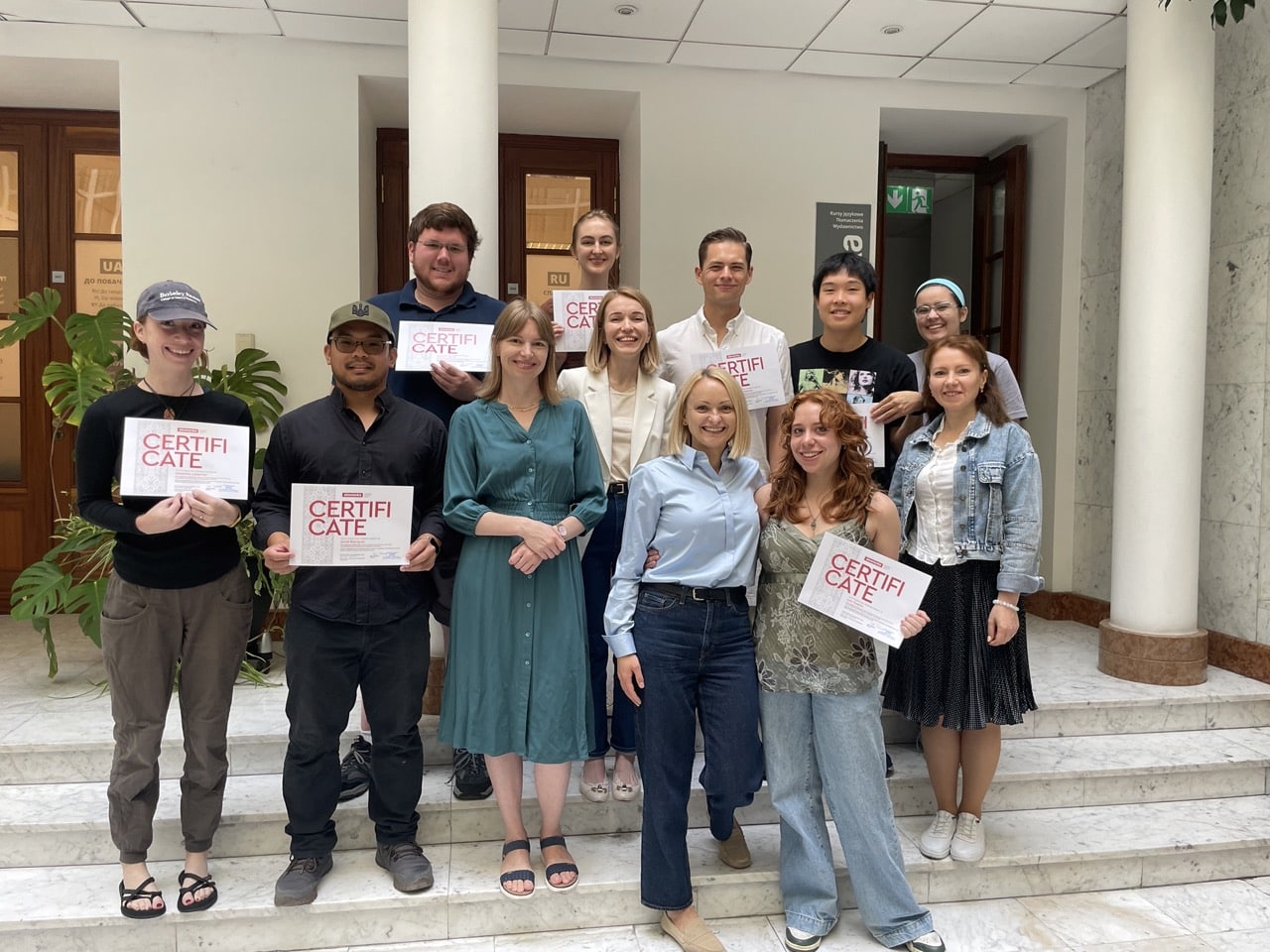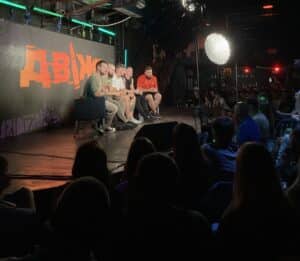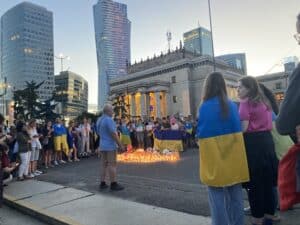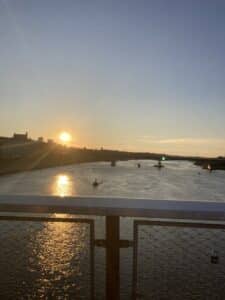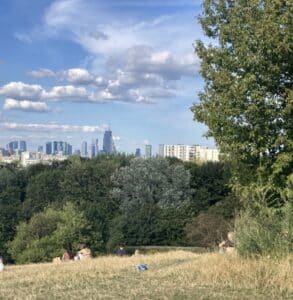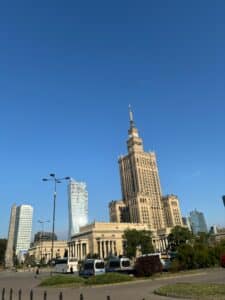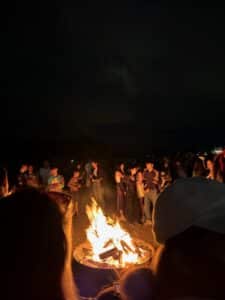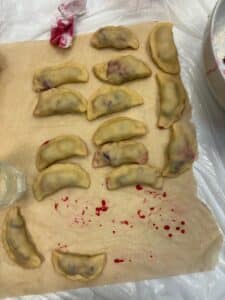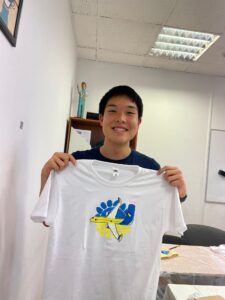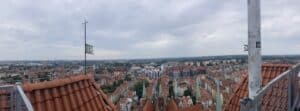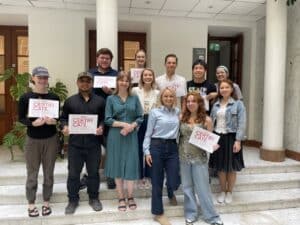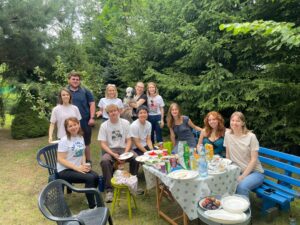Each summer, SRAS offers courses in Warsaw, Poland in Polish and Ukrainian language and culture. Students can specialize in either language and all participants take part in the Slavic Seminar – a series of lectures and workshops diving into topics of identity, language, literature and film, history, and more – and enjoy an extensive cultural program. Warsaw has increasingly become a Slavic hub, with ever increasing numbers of Ukrainians, Belarussians, and Russians. These immigrants come to Warsaw seeking employment, freedom, and safety. Today, all four major Slavic languages and cultures can be commonly found in Warsaw’s streets.
The following reviews discuss specifically studying Ukrainian and experiencing Ukrainian culture while on SRAS’ Slavic Studies Summer in Warsaw.
Alexander Neuman, Summer, 2024
Alexander Neuman, at the time he wrote for this site, was a third-year Ukrainian student spending the Summer of 2024 with SRAS in Warsaw, Poland, supported by the U.S. Department of State Program for Research and Training on Eastern Europe and Eurasia (Title VIII). He was pursuing a Master of Arts in International Security at George Mason University.
Are you interested in learning or enhancing your Ukrainian language? Poland is currently the best venue to acquire the language, culture, and critical geopolitical context you need. I am a master’s student from George Mason University and was fresh out of the United States Air Force when I started the SRAS Slavic Studies Summer in the center of Warsaw. Read on for an overview of the program and how I engaged with language outside the classroom.
Program Overview: Language Classes and Cultural Program
This summer, I completed eight weeks of intensive Ukrainian language study at the SŁOWIANKA Language School. For four hours per day, my B1/B2 class of six students truly felt like a language workshop and unlike any classroom I had experienced in the United States.
My teacher, who also taught Ukrainian to Western diplomats, provided a perfect mix of free flow and structure. We had a rigorous schedule studying grammatical cases and new vocabulary on assigned topics like ecology and emerging technology. We also enjoyed conversing and learning new vocabulary along tangents that were specifically of interest to us. These included Ukrainian media and politics, security, and even agriculture. For our final projects, we gave 15-minute presentations and discussions on topics of our choice, for which our teacher provided vocabulary and initial sources for us to prepare. I discussed Ukraine’s path to NATO, in Ukrainian!
With SRAS and on my own, I sought to maximize my exposure to my target language. I went for Ukrainian audio-guides in museums, like with SŁOWIANKA’s organized tour of the POLIN Museum of the History of Polish Jews. When I spent weekends in Prague, Budapest, and Vienna, I picked tourist brochures in Ukrainian and watched Ukrainian travels blogs to plan my trips.
One highlight for my informal language practice was at Ivan Kupala Night, a Slavic midsummer celebration organized by Ukrainians in Warsaw. Another, more somber one was at a public vigil on July 8. On that morning, traffic on Warsaw’s central Jerusalem Alley, where SŁOWIANKA is located, was restricted for Ukrainian President Volodymyr Zelensky’s visit. His motorcade passed our school twice. Russia chose this day for a missile and drone attack in Ukraine, hitting Europe’s largest children’s hospital in Kyiv. I spoke with several Ukrainians at a candlelight vigil mourning the victims next to the Palace of Culture and Science, which helped inform my later presentation on the importance of NATO membership to deterring such attacks.
Another occasion to engage my language and academic interests was at a public town hall event with Ukrainian soldiers. The 3rd Separate Assault Brigade organized an entertainer-style Europe tour, for which I bought a ticket at Warsaw’s Odessa Club. Its speakers were recent combat veterans who described the initial invasion, Russia’s occupation of Mariupol, and battles in Bakhmut and Avdiivka. At the Q&A, I asked what advice they have for NATO forces training for battles similar to theirs. Their insights were invaluable, and demonstrated the hard-won expertise and perspective that Ukrainians can offer to American and Western European societies.
Over the summer, our teacher emphasized that we should focus on our ability to speak Ukrainian in natural settings while abroad, rather than memorizing grammar and vocabulary, which we could do at home. For example, she provided us a packet of useful interview phrases, and asked us to use our favorites as much as possible. At least for me, the results spoke for themselves.
Learning Ukrainian after Learning Russian: Preparation and Practice
I started my journey with two years of independent study through Duolingo, the Ukrainian Lessons Podcast, and video blogs on YouTube and Telegram. I previously studied Russian as an undergraduate (which included a summer with the SRAS Russian program in Bishkek, Kyrgyzstan). The first time I really spoke Ukrainian was in my pre-program oral proficiency interview in May 2024.
The language workshop showed me how illusive Ukrainian’s similarity to Russian really is. While knowing Russian helped me grasp similar grammatical structures in Ukrainian, and some words were shared, I had to temporarily “un-learn” much of it to correctly pronounce Ukrainian letters. While speaking freely, I had to train myself to not slip into Russian or Surzhyk (more on this below).
Thanks to my prep work, I progressed rapidly, but I could not have succeeded without heavy attention to detail. It took me one month to speak Ukrainian without translating it from English in my mind and triple-checking that I was not accidentally using a Russian word instead of a Ukrainian one.
That’s how my class, along with Warsaw’s hub of Slavic cultures, gave me a unique perspective on the sensitive topic of languages.
Learning Ukrainian with Ukrainians in Warsaw
A lesson that surprised me in Warsaw was that many Ukrainians are with us American students on the journey of learning their national language. Ukraine is a bilingual country, where about 30% of people speak Russian as their primary language. Most Ukrainians understand both languages, with Ukrainian being the official language of education and state institutions.
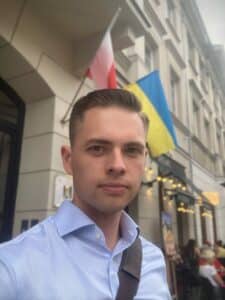
Russian or Surzhyk, a mixture of Ukrainian and Russian spoken by many Ukrainians as a consequence of history, family, region, and daily life (although Surzhyk can also describe Ukrainian mixtures with other languages where diasporas reside, such as Canada and Argentina) was once enough to ‘get by’ in many parts of Ukraine. However, Russia’s full-scale invasion of 2022 changed that: many Ukrainians who spoke mostly Russian until 2022 made a conscious switch to Ukrainian. For example, an Instagram page for Ukrainians in Warsaw that I used to find after-school events was published in Russian until 2023, when posts suddenly began appearing only in Ukrainian.
SŁOWIANKA provided a class on Surzhyk and I heard this mixture on the street, particularly in Ukrainian franchises and venues, such as Lviv Croissants and Pjana Vishnya (“Drunk Cherry” – a Ukrainian Wine Bar) on Nowy Swiat Street beside our hotel. Over the course of the program, I had many ‘aha’ moments when I heard Ukrainian conversations sprinkled with Russian words.
The change to Ukrainian for many heritage Russian speakers came from determination charged with anger, grief, and protest at the invader that claimed to ‘liberate’ them from Ukrainian institutions. There are Ukrainians that are now actively studying their national language, often outside of the homeland, so as to speak it more freely and purely (or even to be able to speak it at all).
Thus, as a foreign language student, I learned that I was on the same learning journey as many citizens of the country I was studying.
Why Learn Ukrainian?
The SRAS Slavic Studies Program helped me diversify my language skills as a regional analyst. As a Russian speaker, I understood that taking the initiative to learn Ukrainian would allow me to show respect and build rapport with Ukrainians, whose stories and insights are critical to ensuring transatlantic security and recording formative history. It was a natural move for my major, desired profession, and academic focus.
I also enjoy Ukrainian for its aesthetic beauty. Some things I love about it are its euphony rules, and the fact that Ukrainian letters are always pronounced the same (unlike the letter ‘c’ in the phrase ‘Pacific Ocean,’ for instance). I adore how Ukrainian months are visually tied to nature: June, cherven’, is named for the color red, and the season of red berries. I celebrated it by eating a lot of cherries from Warsaw’s open-air markets that month. What’s not to love about Ukrainian?
SRAS prepared me well to continue to the next level of my Ukrainian studies. I have now enrolled at the University of Warsaw, where I will be taking Ukrainian at the C level as a visiting student in fall/winter 2024-2025.
Daniel Zou, Summer, 2024
Daniel Zou, at the time he wrote for this site, was an undergraduate at Yale University majoring in mechanical engineering.
A year ago, I would have never imagined spending my first summer of college in Warsaw, Poland, learning Ukrainian. Yet, this past summer I have done exactly that and it has been nothing short of an adventure.
Why Learn Ukrainian?
As a native Mandarin Chinese speaker, I fulfilled my foreign language requirement in high school with Chinese. But when I entered college, I wanted to challenge myself with something new and meaningful. Ukrainian stood out to me for several reasons. In high school, I was fortunate to meet peers from diverse backgrounds, including Ukraine. Their stories and perspectives opened my eyes to a world I hadn’t fully explored, inspiring me to learn more about their culture and identity. The ongoing conflict with Russia made Ukrainian culture and language even more significant, fueling my desire to understand and support this resilient nation.
At Yale, my Ukrainian class was small but tightly knit. Our classes were taught via live video conference with Columbia University, where the professor was based. As an engineering student, I initially saw Ukrainian as a break from my technical studies, but it quickly became much more. The more I learned, the more motivated I became to immerse myself in the language and culture, leading me to consider a summer abroad program.
Given the situation in Ukraine, finding a summer program wasn’t easy. After weeks of searching, I was lucky to discover the SRAS Slavic Studies Summer program. Poland’s role as one of the first countries to welcome Ukrainians displaced by the war made this program feel like the perfect fit.
Warsaw, Poland as a Study Abroad Destination
Eastern Europe was completely new to me, and I didn’t know what to expect. After a 16-hour journey from Houston, Texas, I arrived in Warsaw, energized by the city’s vibe and the camaraderie of my fellow program participants. Warsaw is a city with something for everyone, and I was immediately drawn to its rich history. On our first day, we took a walking tour of the old town, learning about how Warsaw was destroyed in WWII and rebuilt. If you visit, I highly recommend the Warsaw Uprising Museum, which delves into the history of the Soviet and German occupations during World War II and the heroic efforts of the Polish people to reclaim their country.
We stayed in a hotel located in Warsaw Uprising Square in the Downtown District, surrounded by a variety of eateries, cafes, and shops. The city’s public transport system, including subways, trams, and buses, made getting around easy.
One of the most striking things about Warsaw is how common it is to hear Ukrainian on the streets. The city is a linguistic tapestry, with Polish, Ukrainian, English, Russian, and Belarusian frequently spoken. Given the similarity between Polish and Ukrainian—about 60% of the vocabulary is shared—it’s possible to use Ukrainian for simple tasks like ordering food. Fortunately, many people in Poland also understand English, making communication even easier. With the significant Ukrainian diaspora in Poland, I found myself using Ukrainian daily, even outside of class.
Ukrainian Language Classes in Poland
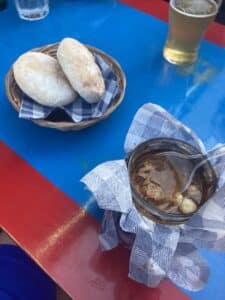
Our Ukrainian classes were held at the Slowianka language school, an SRAS partner, which was not far from our hotel. We met five days a week for two 90-minute sessions each day with a break in between. Our teachers were fantastic! I was placed in the A2 group, where we covered various themes and grammatical concepts, including all the grammatical cases, imperfect/perfect verbs, verbs of motion, and topics ranging from shopping to online learning. All classes were conducted in Ukrainian, which was a challenge at first, but I quickly adapted. Though I initially relied on my beginner’s knowledge to get by, I gradually made significant progress.
With just three students in my class, we each had ample opportunities to practice speaking, listening, and writing. The small class size fostered a close-knit, supportive environment, where learning felt comfortable and informal. The biggest challenge for me was mastering the application of grammatical cases and expanding my vocabulary. Every day brought new words, and keeping up was a challenge, but the steady progress was rewarding.
Our class frequently went on outings with our teacher, visiting museums, enjoying Polish food at a Milk Bar, or taking walks—all while conversing in Ukrainian. We explored places like the Polish National Bank, the Geology Museum, and Old Praga, and even strolled around during Taylor Swift’s iconic The Eras Tour concert in Warsaw.
Each week, we also had a peer language partner with whom we discussed a topic in Ukrainian for an hour. This was challenging at first, as natural conversation in Ukrainian was fast and difficult to follow, but each week I noticed improvement in my abilities. Gradually, I became less dependent on translating from English to Ukrainian and more capable of responding naturally in Ukrainian. This stage of learning requires a lot of speaking practice, but eventually, you accumulate enough phrases to carry on a normal conversation—and maybe even pass as a native speaker at first glance.
Learning a language is hard work. There were times I wished I could just “know it” and even entertained the idea of spending 24 hours straight drilling vocabulary. But I learned that the journey is as important as the outcome. It’s not a sprint; it’s a marathon, and day by day, you make progress. By the end of the 8-week program, I had advanced from an Intermediate Low to an Advanced Low on the ACTFL scale.
Cultural Immersion
Though our program was based in Warsaw, we had numerous opportunities to immerse ourselves in Ukrainian culture, both through organized events and those we discovered on our own. The “Ukrainians in Warsaw” Facebook group is a great resource for finding Ukrainian events and social gatherings. Many of us attended an Ivana Kupala event on our first weekend, where we made vinoks (flower crowns), jumped over bonfires, and sang Ukrainian songs, according to the holiday traditions.
Our program also arranged various cultural activities, such as a tasting of Ukrainian cuisine, a varenyky master class led by a Ukrainian pastry chef, T-shirt painting with a Ukrainian artist, and round-table discussions. We also had weekly special topic lectures covering subjects like Ukrainian history, the linguistic situation in Ukraine and Eastern Europe, the Interslavic language, and a cinema club. I found the linguistic topics particularly fascinating—learning, for instance, that Polish and Ukrainian have different alphabets (Latin for Polish and Cyrillic for Ukrainian) but many similar-sounding words that allow speakers to understand each other.
These events made Ukrainian culture and language highly accessible in Warsaw.
Connecting with Locals and Learning Abroad
Personally, I also connected with many Ukrainians by attending church on Sundays. This not only provided additional opportunities to practice Ukrainian but also allowed me to hear firsthand accounts of their experiences. I met families who had fled Ukraine due to the war and individuals who had left because of the mandatory conscription laws. Their stories were powerful and left a lasting impact on me. The courage these people showed in making incredibly difficult decisions was deeply inspiring.
Poland felt very different from the United States—not just in obvious ways, but in the contentment I observed in people’s identities. There was a sense of happiness and community that felt more palpable than in America. While this could have been me falling in love with the city and the culture, I couldn’t help but notice the calm and sense of safety that seemed to pervade daily life in Warsaw. Parks were lively with youth, the city felt vibrant yet homey, and people seemed to have the time to enjoy life. This sense of peace, in contrast to the busyness I’m used to in the U.S., was life-affirming and inspiring. I would love to visit again, and this experience has only deepened my desire to learn and study abroad more. There’s so much to learn from other cultures, especially from the subtle aspects that shape how we live and feel.
Overall, I’m incredibly grateful for the opportunity to Warsaw: Slavic Studies Summer with SRAS. The growth I’ve experienced in my thinking, the cultural insights I’ve gained, and the language skills I’ve developed are immeasurable—and certainly couldn’t have been achieved in a traditional classroom. If you’re considering this program, I highly recommend it! As someone who had little prior connection to Ukrainian culture and language, this experience has broadened my perspective and enriched my understanding of the world.
You Might Also Like
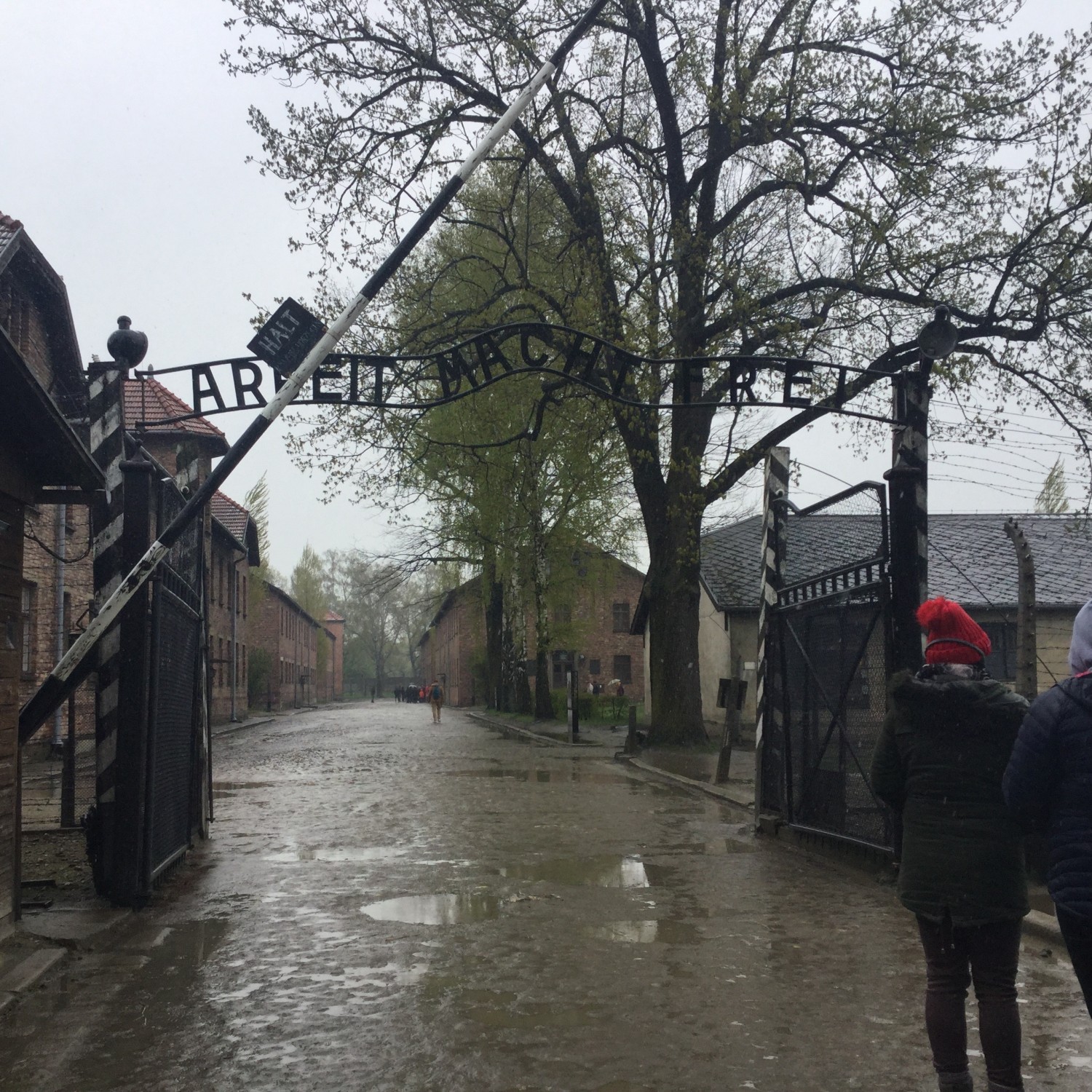
Travel from Warsaw to Auschwitz-Birkenau
Travel from Warsaw to Auschwitz-Birkenau An Eye-opening Experience ~$80 for a day trip While in Poland, I decided to take in one of its most famous tourist sites – which also happens to be the site of one of the 20th century’s most horrific and painful events. In terms of budget, if you are looking […]
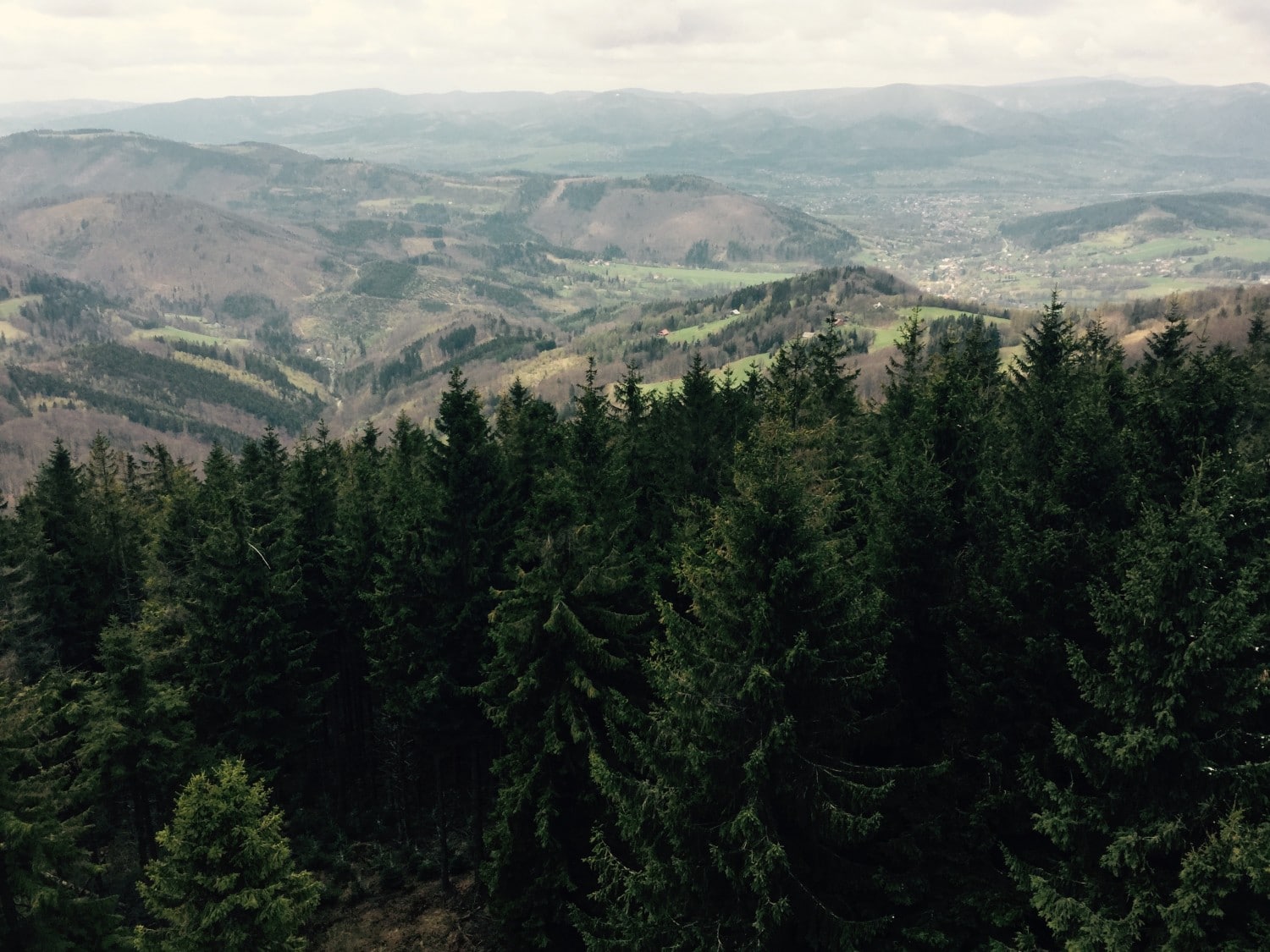
Travel from Warsaw to Ustroń Polana
Travel from Warsaw to Ustroń Polana A Spring Break of Quiet Solitude ~$150 for 2-3 days Usually about the time spring break comes around in the US, I am ready for a week off class. I like to spend this time in some remote region where the sound of a car driving by is unlikely […]
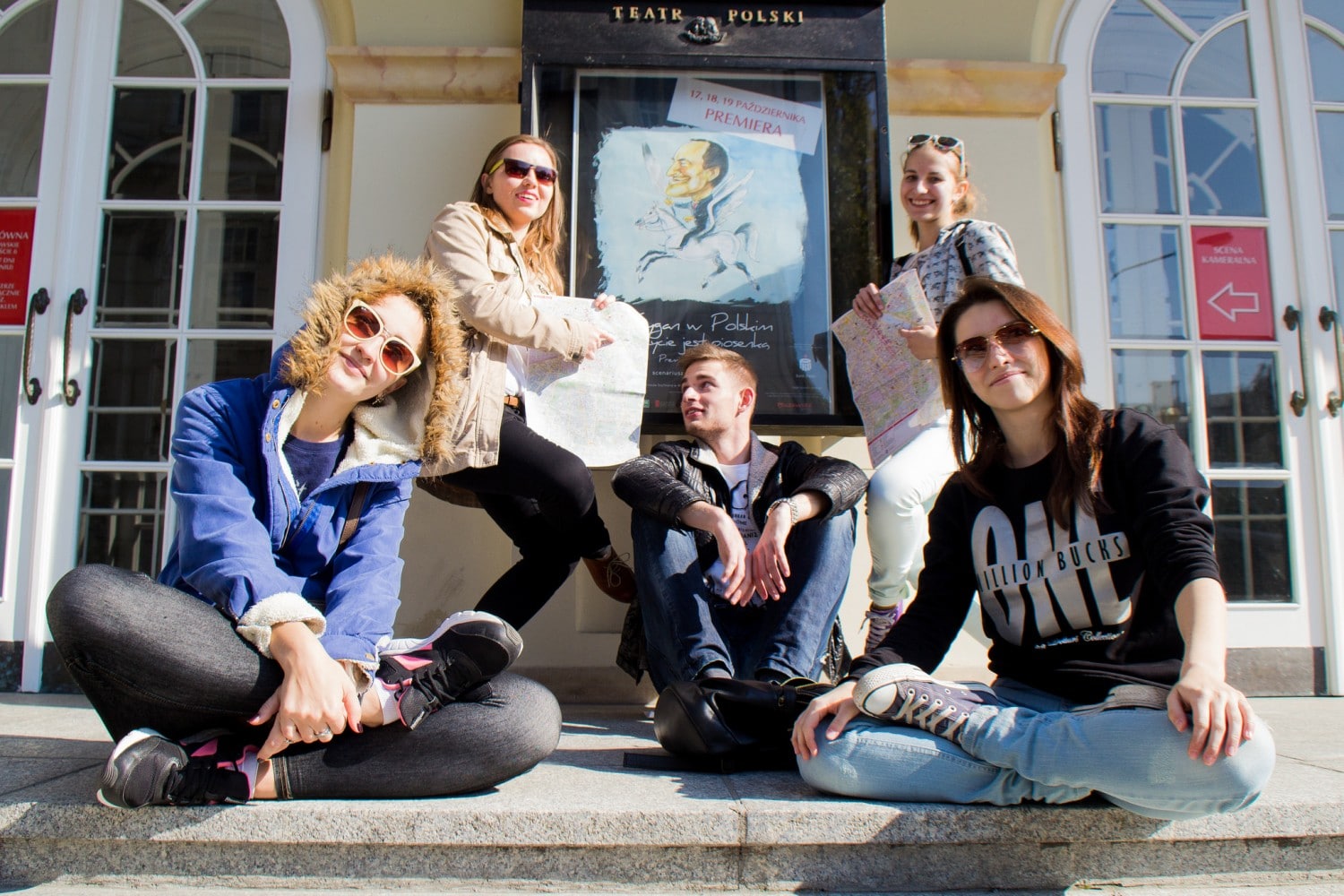
SRAS Guide to Living in Warsaw
What’s it really like to live in Warsaw for a semester? Staying long-term in a city is much different from just vacationing there. You’ll need to navigate more of the practical, everyday services of the city and budget to include more miscellaneous and long-term expenses. Thus, this guide covers everything from haircuts to pharmacies and […]
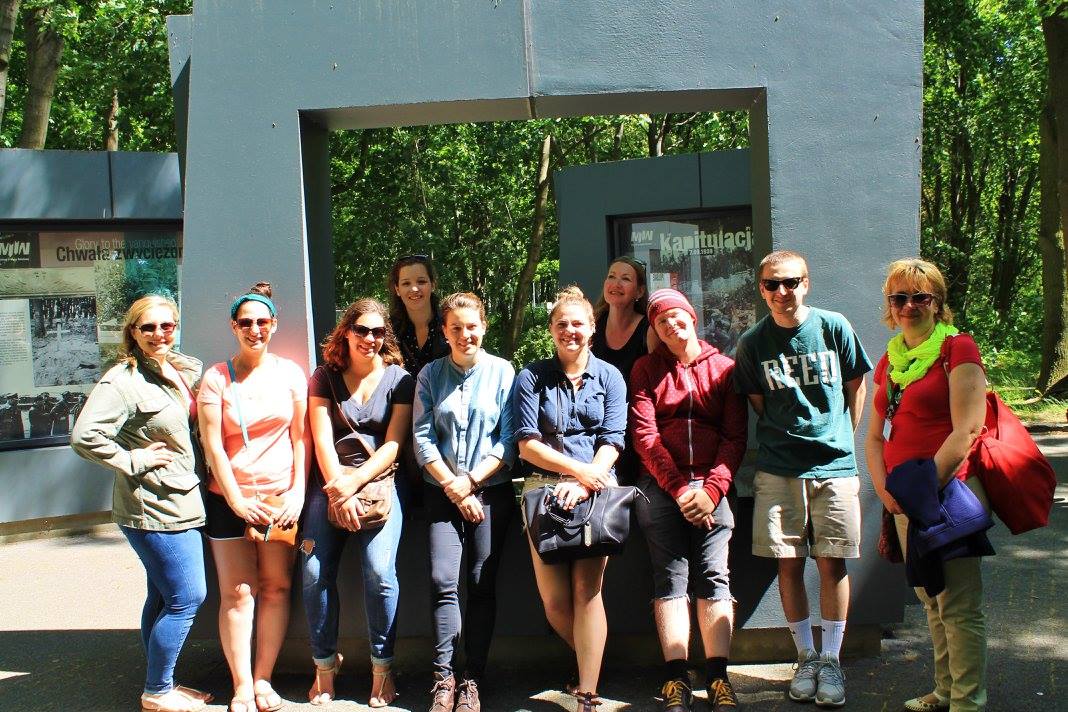
Warsaw Study Abroad Reviews
We asked some SRAS graduates to share their open and honest evaluations of their experiences on SRAS Study Abroad in Warsaw. SRAS actively seeks out feedback from students on all programs so that we can continually improve our offerings. Benjamin DeYoung (Summer, 2015) Note: this is an evaluation of Crossroads of Empires, SRAS’ inaugural […]
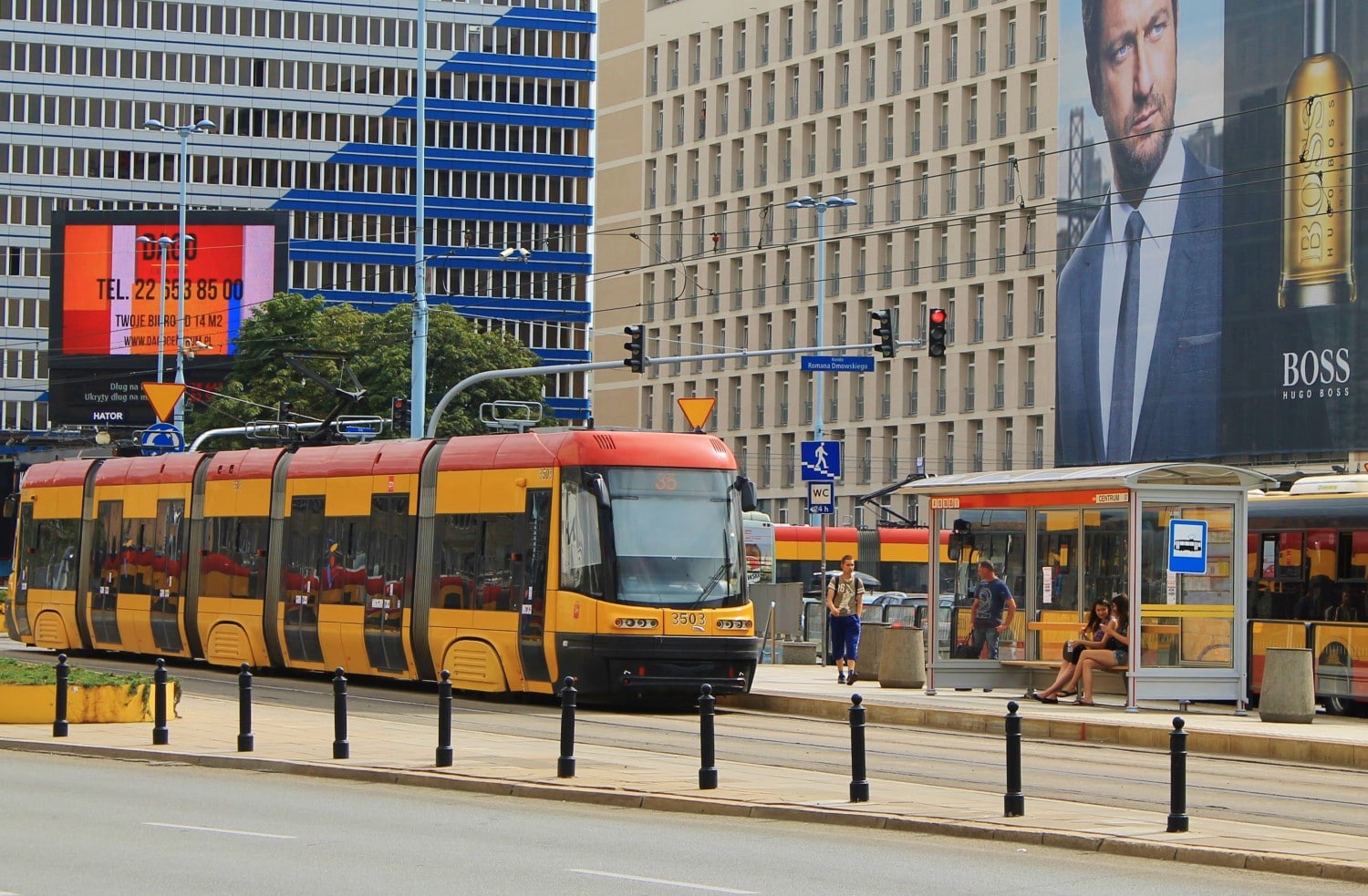
Warsaw Housing
SRAS programs in Warsaw are hosted at Collegium Civitas in the downtown area. For summer programs, housing is provided in a nearby hotel, with twin rooms and breakfast (substantial). For spring or fall programs, students find apartments with assistance from Collegium Civitas. See the individual programs linked above for more information. This page is meant […]

